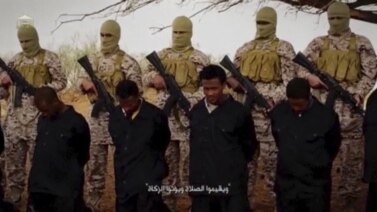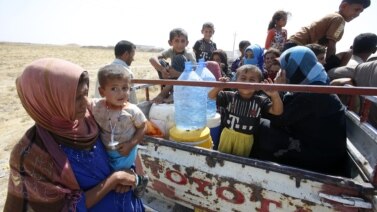One year ago, Islamic State militants raided the homelands of Iraq's Yazidi community. The attackers killed hundreds of men and enslaved thousands of women.
Many Yazidi families fled to the top of Sinjar Mountain. But they had very little or no food and water. Reports of their situation led Kurdish fighters to action. Western military aircraft began flying food and water to the Yazidis. Then, the U.S. military launched airstrikes against the Islamic State.
Yazidis who survived the violence have settled around the mountain. Many of them went to the city of Lalish on Sunday, a day before the first anniversary of the killings. The city has a famous Yazidi shrine.
Yazidis went there to meet, pray and wash in the holy waters of their temple.
'There was no food, no water'
Murad Aloo was among them. He walked around the temple grounds, stopping at the stand selling water and ice cream treats. But he could not find peace. He said his mind replayed images of what happened 12 months ago.
On that day, he said, the shooting started at around 10 in the morning. The Yazidis soon realized that they were the targets of Islamic State militants. So, tens of thousands of Yazidis fled to Sinjar mountain.
"I will never forget what happened,” Mr. Aloo said. “I saw mothers leaving their daughters behind, fearing for their own lives. I saw women and men being slaughtered, even pregnant women."
Mr. Aloo then pulled out a cell phone to show a picture of his brother. He said his brother decided to stay and fight for Yazidi land. Mr. Aloo said he never saw him again.
The man began to cry as he remembered the days on the mountain. He said there was no food or water. Many starved or died of thirst.
Shrinking population
Women and girls walked without shoes at the Yazidi temple. They washed in its holy waters. Some children filled plastic bottles with water from a pipe sticking out of stone wall.
Not all the visitors were from Sinjar, but those among them who fled the attack are haunted. They remember what was happening a year ago. The Islamic State considers the Yazidis devil-worshippers. Its fighters executed young men, raped little girls and enslaved thousands of women.
Yazidis are a minority community in Iraq, and a religious group with fewer than a million members in the world. Being forced from their ancestral Iraqi land is like a death sentence.
Sheikh Ismail Murad Qasim, another survivor, sat in the cool shade of a stone cave. He mourned the death of his community.
"This is the end of our people,” he said. “They have massacred us in the thousands, raped eight- and nine-year-old girls, the future of our Yazidi community."
The spiritual elders of the shrinking population are trying to keep their people together. They urged them to stay in Iraq. But it is difficult, they said.
Baba Sheikh, the Yazidi's spiritual leader, told VOA, "We call for the protection of the Yazidis. We are alone. We have no one to turn to. And we pray, we pray for God to bring harmony among all religions."
No 'future for me'
Mr. Aloo is too traumatized to even think of that kind of understanding.
"I wish I were among the dead, instead of witnessing what I have seen,” he said. “I don't think there is a future for me, I am just so heartbroken. I don't think there is a future for me."
I’m Caty Weaver.
VOA’s Sharon Behn reported this story from Lalish, Iraq. Caty Weaver adapted it for Learning English. George Grow was the editor.
Words in This Story
shrine – n. a place connected with a holy person or event
temple – n. a religious center
slaughter – v. to kill (many people) in a very violent way
massacre – v. to violently kill (a group of people)
harmony – n. people living together in a peaceful and friendly way.
traumatize – v. to cause (someone) to become very upset or troubled in a way that often leads to serious emotional problems


